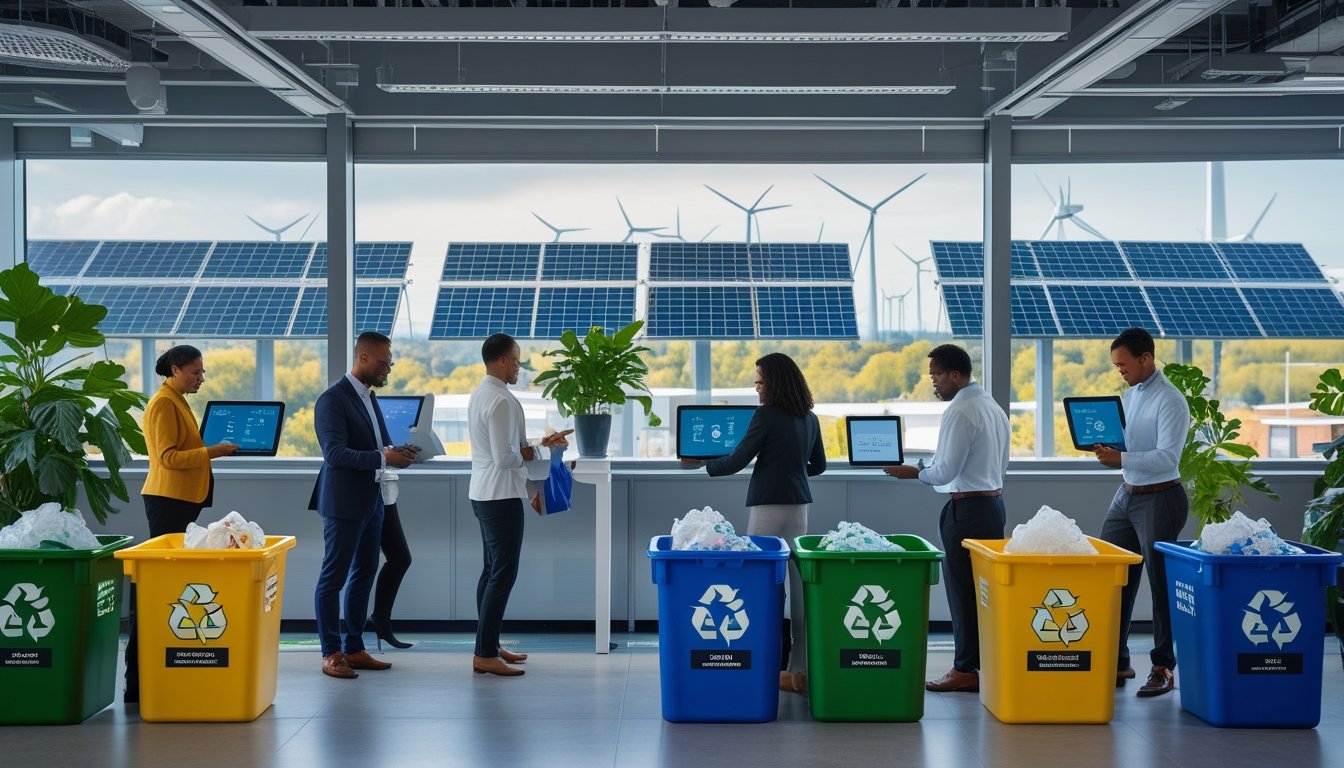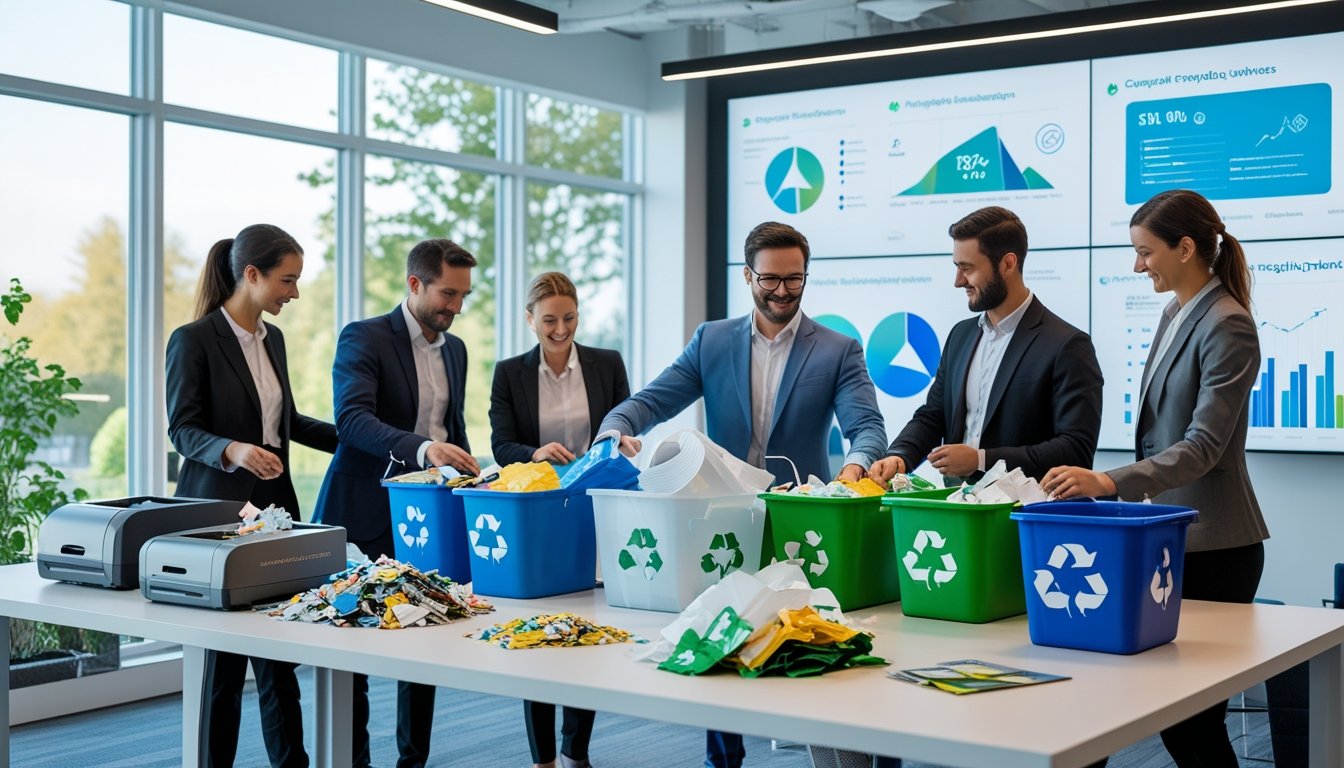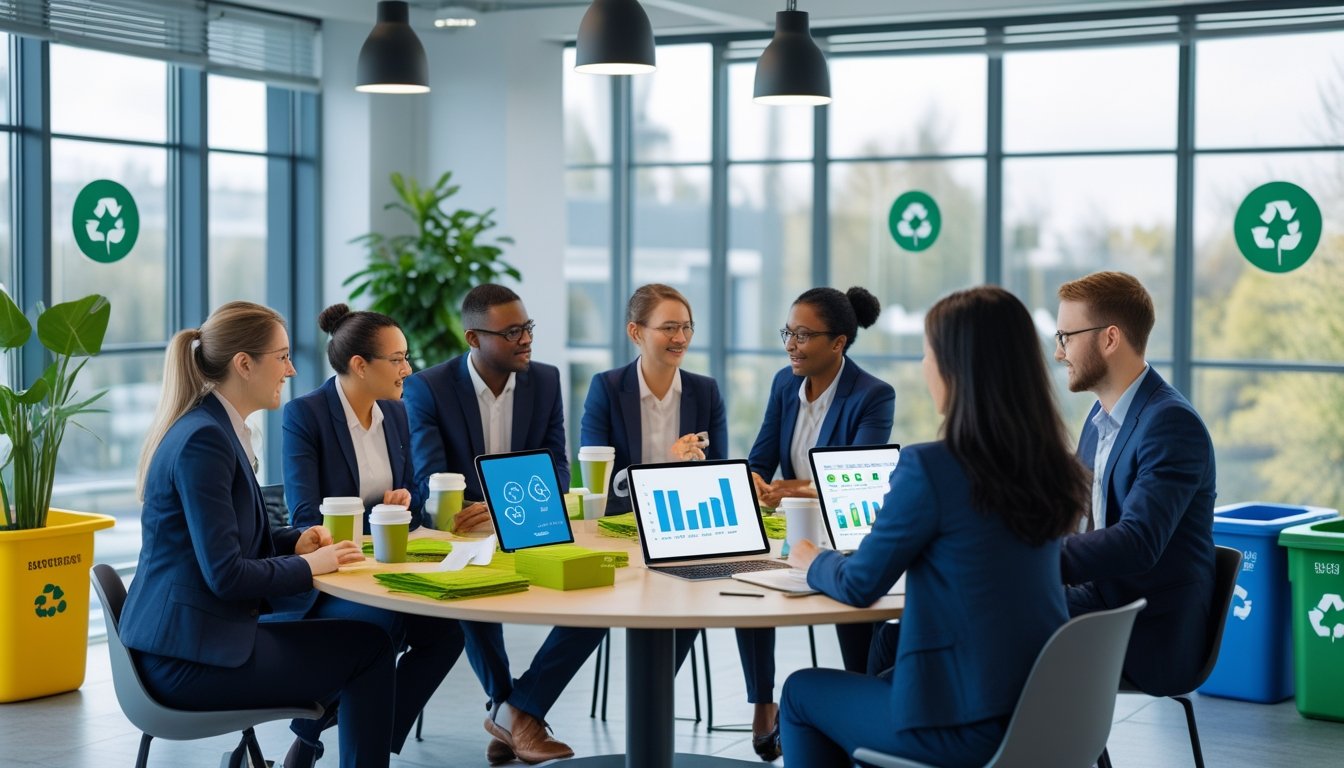Late updated: 14 Oct 2025 12:10
Written by: Amber Collins
Sustainable Innovations In UK Business Recycling Practices: Leading Environmental Change
Sustainable innovations are reshaping the landscape of business recycling practices across the UK. With growing environmental concerns and an urgency to reduce waste, companies are increasingly adopting circular economy models. These innovative systems not only minimise waste but also maximise resource use, driving both sustainability and economic benefits for businesses.

The integration of cutting-edge technologies and practices is transforming how UK businesses manage recycling. From closed-loop systems to zero-waste initiatives, firms are finding inventive ways to rethink resource management. This shift signals exciting opportunities for leaders to not only enhance their sustainability credentials but also engage eco-conscious customers and investors.
As we explore these developments, we delve into the transformative power of recycling technology and its role in driving a greener future. The UK is at a critical juncture in embracing recycling innovations that promise to lessen the environmental impact while providing economic advantages.
Key Takeaways
- Sustainable innovations boost resource efficiency in UK business recycling.
- Emerging technologies lead to transformative recycling practices.
- Circular models attract eco-conscious stakeholders.
Key Sustainable Innovations Transforming UK Business Recycling Practices

The transformation of the UK recycling landscape involves essential advancements in waste management, innovative circular economy models, and pioneering green technologies. Legislative measures are further supporting these green initiatives.
Advancements in Waste Management and Recycling Rates
Waste management in the UK is evolving with the integration of cutting-edge technologies. AI and robotics are revolutionising sorting processes, thereby enhancing recycling rates. Automated systems reduce errors and increase efficiency in separating recyclable materials. These advancements not only improve recycling rates but also contribute to reducing landfill waste, a significant component of the UK’s sustainability goals.
Data analytics plays a pivotal role in monitoring and optimising these processes. By collecting and analysing data, businesses can adapt their strategies to maximise efficiency and minimise waste. As a result, waste management becomes more responsive and effective, fostering a more sustainable environment.
Integration of Circular Economy Models in Business
Integrating circular economy models is crucial for sustainable business practices. By adopting these models, companies shift from a traditional linear approach—take, make, dispose—to strategies that emphasise reuse and regeneration of resources. This shift aids in reducing waste and conserving resources, which aligns with the UK’s larger environmental objectives.
Businesses are adopting repair and refurbish initiatives, enabling products to have extended lifecycles. This practise not only minimises waste but also fosters innovation in producing more durable goods. By focusing on material recovery, companies enhance their sustainability while reducing production costs.
Pioneering Green Technology Solutions
The role of green technologies is significant in improving business recycling practices. Innovations such as plastic-eating enzymes are being explored to address plastic waste, a persistent environmental challenge. These enzymes break down plastics efficiently, thus providing a viable solution to one of the world’s most pressing waste issues.
Moreover, advancements in bio-based plastics offer promising alternatives to conventional plastic materials. These biodegradable options reduce dependency on fossil fuels and lessen environmental impact. As UK businesses adopt these green technologies, they are at the forefront of sustainable innovation, leading to a more resilient and eco-friendly economy.
Legislative Drivers and Green Initiatives
Legislation plays a vital role in driving sustainable practices within UK businesses. Government policies, such as the 25-year environment plan and commitments to net-zero targets, incentivise companies to adopt greener practices. Such regulatory frameworks encourage innovation in recycling and waste management.
Green initiatives are also incentivised through grants and tax benefits, supporting businesses in their transition towards more sustainable operations. These measures not only motivate companies to reduce their carbon footprint but also enhance their competitive edge in a market increasingly focused on sustainability. These combined efforts demonstrate the power of legislation in advancing environmental responsibility.
Emerging Technologies Driving Sustainable Business Recycling
In recent years, the landscape of business recycling in the UK has been transformed by cutting-edge technologies. Artificial intelligence (AI) and the Internet of Things (IoT) are at the forefront, boosting efficiency and precision. Meanwhile, advancements in recycling processes and smart systems are enhancing tracking and management capabilities.
Role of Artificial Intelligence and IoT in Recycling
AI and IoT play pivotal roles in streamlining recycling efforts. AI enhances sorting accuracy, using computer vision to differentiate materials swiftly. This leads to higher recycling rates and reduces contamination. IoT devices offer real-time data, optimising waste management processes by predicting when bins need emptying. Their integration facilitates proactive responses, reducing operational costs and minimising environmental impact.
These technologies also gather valuable data, aiding in better decision-making for companies striving to meet sustainability goals. As more businesses adopt AI and IoT, their potential to revolutionise recycling heightens, placing the UK at the forefront of green technology.
Advanced Recycling Technologies and Processes
Advanced recycling technologies are reshaping how we manage waste. Chemical recycling breaks down complex plastics into simpler molecules, enabling reuse that mechanical methods can't achieve. Biotechnology, including enzymes, transforms organic waste efficiently, converting it into valuable by-products like biogas.
Innovations in recycling processes focus on source reduction and material recovery. Techniques such as pyrolysis and gasification process waste with minimal emissions, addressing climate change concerns. These methods not only allow for broader material recovery but also create avenues for generating energy from waste, contributing to a circular economy.
Smart Waste Tracking and EDI Systems
Smart waste tracking systems are becoming integral in business recycling operations. They use Electronic Data Interchange (EDI) to automate and streamline data exchange, ensuring accuracy and timely updates. These systems enhance transparency and compliance with environmental regulations by providing detailed insights into waste generation and disposal patterns.
RFID technology is frequently employed for tracking waste containers, ensuring secure management of recyclable materials. This technological evolution allows businesses to optimise logistics, reduce costs, and enhance sustainability efforts. The combination of smart tracking and EDI paves the way for improved accountability and efficiency in recycling practices.
Together, these innovations are paving a pathway for more sustainable business operations, aligning with both environmental considerations and economic objectives.
Frequently Asked Questions

Our investigation into business recycling innovations in the UK has revealed key areas where progressive changes are taking place. Businesses are prioritising sustainable practices while also benefiting from governmental initiatives and technological advancements.
What are the leading methods being adopted by UK businesses to reduce plastic waste?
UK businesses are increasingly adopting biodegradable alternatives to traditional plastic, such as compostable packaging. Many companies are also enforcing stricter recycling protocols to ensure plastic waste is properly sorted and processed. Reusable systems, for instance, refill stations for consumer goods, are gaining popularity to minimise single-use plastics.
How is the UK government incentivising companies to implement greener recycling solutions?
The UK government supports green recycling through tax incentives and grants for sustainable practices. It has introduced regulations, like the 2025 Simpler Recycling laws, requiring businesses to adhere to recycling standards, persuading them to adopt cleaner methods. Companies that comply with these standards can avoid fines and benefit from governmental support.
What role does technology play in enhancing recycling processes within UK industries?
Technology has transformed recycling in UK industries by introducing automated sorting systems and AI-driven analytics. These advancements allow for efficient waste categorisation and resource recovery. Smart bins equipped with sensors provide real-time data to optimise recycling operations, thus reducing errors and improving the overall recycling rate.
How are UK businesses collaborating to achieve higher standards in recycling operations?
Collaboration among UK businesses has become vital in raising recycling standards. Companies are forming partnerships to share innovative solutions and develop best practices. Industry-wide coalitions, like packaging alliances, encourage the sharing of knowledge and resources, enabling smaller businesses to participate in more effective recycling schemes.
What are the emerging trends in circular economy practices among UK companies?
UK companies are embracing circular economy practices by designing products with end-of-life recycling in mind. Emphasis on refurbishing, remanufacturing, and repairing products is becoming more common. Companies are also investing in product life extension and material reutilisation, focusing on a closed-loop system to minimise waste.
Which industries in the UK are leading in the adoption of innovative waste management and recycling practices?
The retail and consumer goods sectors in the UK are at the forefront of adopting innovative waste management strategies. Businesses like Unilever and Marks & Spencer have made significant strides in implementing comprehensive sustainability programmes. These industries focus on reducing waste, improving packaging recyclability, and setting net-zero emission goals.
